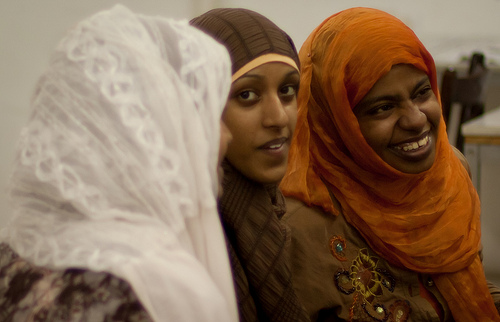In an attempt to highlight the situation of the Nubian community and to challenge stereotypes about them, on April 18 the Nubian Democratic Youth Federation [ar] organized a day of blogging and tweeting [ar] about their cause. The event took place on the occasion of the last forced migration of the Nubians before their land was submerged in April 1964 when the High Dam was built in Aswan.
The Nubians are an ethnic minority that live in southern Egypt and northern Sudan, and they were forced to migrate from their land several times between 1902 and 1964. Apart from losing their land, their language and culture has been marginalized.
Nubian activist and blogger Fatma Emam, one of the day’s organizers, wrote on her blog:
The Nubian issue in Egypt raises many questions, about race, class, democracy, citizenship and human rights. Nubians in Egypt suffered for long time from racism, alienation and neglection for their basic rights. Sadly the Nubian issue is not on the political agenda of almost all the political factions in Egypt, we might hear of Nubian issue only because of the demographic mass of Nubian voters, which was crystal clear the presidential race after the revolution. One of the main obstacles Nubians are facing while fighting for rights is the ignorance of the public opinion about their cause, that the “ordinary” Egyptian associate Nubia with folkloric dancing and music and they deny the pain which prevails in the Nubian history. […] The Nubians faced harsh discrimination and racism when they inhabited the cities, and they worked in the low profile jobs. Although Nubians proved in many times that they belong to Egypt and they are willing to sacrifice for a better tomorrow, Egypt as a government neglected Nubians and as a population discriminated against them. One might ask what are the demands of Nubians now? Full citizenship, where their history is celebrated and taught in schools as part of Egyptian history, going back to the land around the lake, naming the lake Lake Nubia [instead of Lake Nasser] and having a say in the development plans in their region. Nubia is not a homeland we live in, it is an identity, and cause we live for.
Blogger Saqr Helal reflected on the forced migration of the Nubians, and having to see the name of the person responsible everywhere:
التهجير هي العملية التي تمت وهي اسم المكان الذي ولدت فيه. وتزداد المفارقة بان يلتصق اسم الوطن الجديد بالشخص الذي تسبب فى هجرتنا “مركز ناصر” كما قلت فانت محاصر بذكري عملية التهجير وبشخص المهجر فى كل مكان بموطنك الجديد وبكل اوراقك ففي كل مرة اضطر ان اسجل محل اقامتي او اتفحص بطاقتي واوراقي استعيد كل ما مضي: الهجرة, التهجير وعبدالناصر. الذي لم يسمي باسمه فقط المركز الذي سكنه المهاجرين ولكن ايضا البحيرة التي يرقد تحتها رفات أجدادي. المفارقة ان البحيرة التي يقع ثلثيها فى اسوان وثلثها الاخر بالسودان, يسمي ثلثها السوداني ببحيرة النوبة في حين ثلثيها المصري ببحيرة ناصر
Tweets for the day can be found on the hashtag #نوبة (“Nubia” in Arabic).
Marwa Zaky said:
@MarwaZaky2005: حمى الحنين و الانتماء للنوبة مرض لن نشفى منه و سنعدى به أولادنا و أحفادنا #نوبة
Yahia Zaied warned:
@Yo7ia: دائما تذكروا #النوبة ليس اغانى ورقص فقط النوبة شعب يعانى وحضارة وتاريخ يضيعان ولغة وترلث انسانى سيختفى
Eslam Salheen wrote:
@EslamSalheen: لما بنقول ان فئات من ابناء هذا الوطن بيتعرضوا لاشكال عدة من العنصرية ده مش معناه اننا رافضين وطننا لكن اننا عاوزينه وطن افضل للجميع #نوبة
Azza Matar added:
@AzzaMatar: شئ مؤلم ان ترى جزءا هاما من تاريخ البشرية غارقا تحت بحيرة السد العالى والاكثر ايلاما ان يكون العالم كله مشتركا فى هذه الجريمة #نوبة
Blogger Mohamed Mahmoud Moqbel discussed the lack of Nubian representation in media:
خلاصة القول أنك إن أحببت أن ترى النوبة فلا يمكنك أن تراها عبر الشاشة التى لم تقدم الواقع اليومى الذى يعيشه أهل النوبة البقعة الجميلة من جنوب الوطن ، و ما زال هناك الكثير من الكنوز التى يمكن تقديمها عن هذا العالم بما له من خصائص فقط تنتظر الفنان الحقيقى الذى يقترب منها
Mohamed Aly Talibab shared a link to photos of Nubia taken by John A. Larson between 1905 and 1907.
While many Twitter users shared Nubian music and songs, other shared videos highlighting the Nubian cause, such as this video in which filmmaker Nada Zatouna shares her experience as a Nubian woman who participated in the revolution [ar, for subtitles click cc]:
The day led to many blog posts and Twitter discussions. Blog posts were collected at the Nubian Democratic Youth Federation blog. The initiative also managed to get mainstream media attention, such as this article, and this TV interview [ar], in which Fatma Emam was interviewed.









4 comments
She not Nubian she is Egyptian
In addition to all the information about Nubia please check http://www.slideshare.net/ExperienceNubia/presentation-nubian-antropology